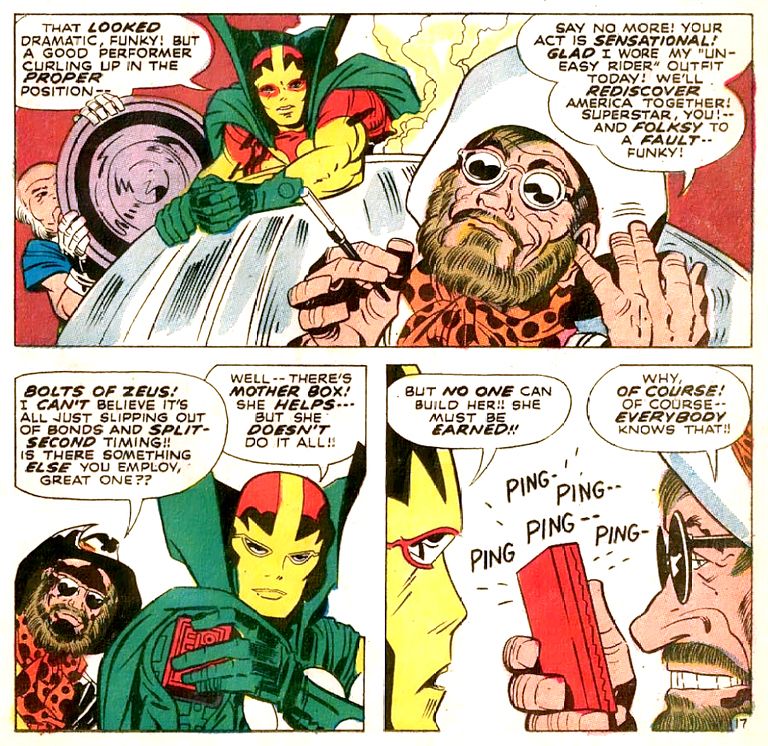 |
| Words and pencils by Jack Kirby, inks by Mike Royer (Mister Miracle #6, Jan.-Feb. 1972) |
I'm a little upset about this. It's not even as if this is some obscure bit of comics history. Way back in 1972, in Mister Miracle #6 (January of that year, to be exact), Jack Kirby vented some of his post-Marvel frustration by lampooning his former creative partner Stan Lee in the story "Funky Flashman." "Funky Flashman" came out in a mainstream book from DC, not in some indie book or underground title and Jack's target was pretty obvious, hardly obscured by his funky pseudonym. Plus I'm pretty sure The Jack Kirby Monthly from TwoMorrows covered the whole thing extensively in that hyper-geeky way that makes me love that magazine so (talk about your narrow focus!). So when Brian Cronin at Comics Should Be Good on the Comic Book Resources website dragged out "Funky Flashman" one more time last week, why did it upset me?
Because I've been thinking about writing something about good ol' Funky for years and years and years. Okay, years. Months, maybe. So while Funky isn't a hidden bit of lore-- his misadventures are readily available in the still-in-print Jack Kirby's Fourth World Omnibus Volume Two and you really should own a copy for yourself-- I wanted to spout off about him as if I'd uncovered him after some laborious detective work. So I'm going to, even if my take is half-formed.
I've always loved the story "Funky Flashman." It's vitriolic and even unfair-- I mean, taking a shot at poor Roy Thomas, depicted by Kirby as Houseroy, a diminutive lackey forever fawning over a Flashman who will feed him to his enemies before making good his own escape, seems a low blow no matter what your grievances against his boss-- but it's energetic and by some imp of the perverse, every bit as charismatic as his real-world inspiration.
Flashman is indomitable and in that way, if not admirable, he's at least a little likable. Definitely a compelling figure. A scene-stealer. Flashman dominates every panel in which he appears, even alongside Big Barda as she plays with a revolver. But maybe that's just me. I have a strange attraction to these kinds of characters, shifty grifters with positive, can-do attitudes. The Milo Minderbinders of the literary world. They're quintessentially American types, aren't they? These Jay Gatsbys, forever recreating themselves in whatever image will win them Daisy Buchanan or money or acclaim. A Horatio Alger tale, but instead of some dopey kid who earns a reward for being so honest and stalwart, we get a complete bastard who pulls himself up while pulling others down. And always with a smile on his face and a neat turn of phrase.
There's something to be said for someone who never gives up, who takes a beating-- even if they allow others to get it worse than themselves-- and dusts himself off before strutting on over to his next con-job. Flashman is obviously a sociopath, but he's also never-say-die, endlessly up-beat, a bold figure we have to grudgingly admire for his knack for survival. If nothing else, Flashman is fun to read about. Guys like that can even be fun to know in real life, provide you don't go into business with them.
Flashman is a vicious caricature of Stan Lee. He even looks like Lee. Obviously, Stan the Man deeply hurt Jack Kirby at one point, whether deliberately or by accident. Kirby's response may be passive-aggressive, but it's also entertaining. The man was a storyteller. And no one said caricatures have to be nice. The best rarely are. Yet Flashman is more than that, too. Because Kirby-- at least in his prime and at his most involved, as he was with the Fourth World books at this point-- couldn't produce a one-dimensional character if he tried, Flashman's got his inspiration's wit as well. Kirby wisely left it up to the readers to decide if Flashman is a villain or a hero. He's probably a bit of both. Always a survivor.
As Flashman tells himself in the final panel, "On to new conquests, Funky Flashman, you winner you!!!"

No comments:
Post a Comment